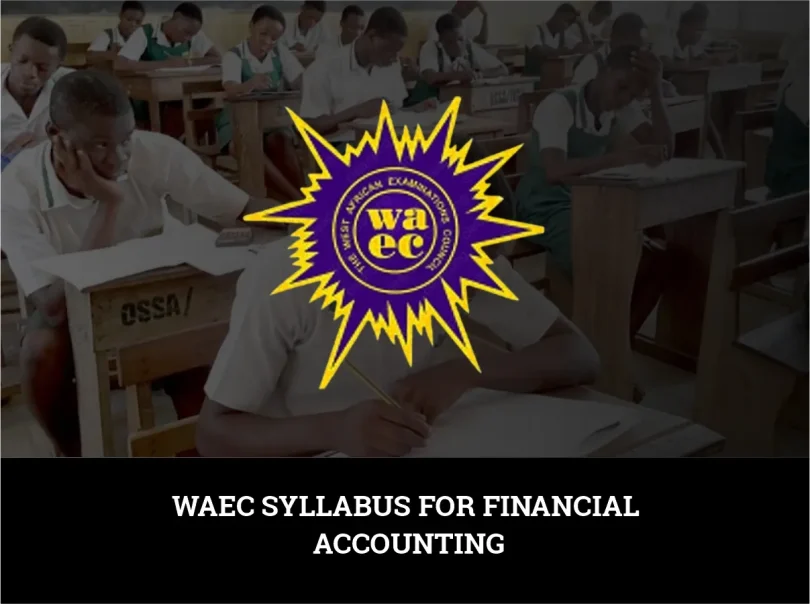Preparing for the WAEC Financial Accounting exam? One of the best ways to boost your chances of success is by studying with the official WAEC Syllabus for Financial Accounting. It outlines all the topics you are expected to cover, the structure of the exam, and the key areas you should focus on. If you are sitting for the exam in Nigeria, Ghana, Sierra Leone, Liberia, or The Gambia, the syllabus will help you stay on track.
In this article, you will find the full WAEC Financial Accounting syllabus, the examination scheme, and a list of recommended textbooks.
Scheme of Examination
The Financial Accounting exam consists of two papers taken in a single session:-
Paper 1 (Objective)
- 50 multiple choice questions
- Duration: 1 hour
- Total marks: 50
Paper 2 (Essay)
- Duration: 2½ hours
- Two sections:
Section A (Theory): 5 questions; answer 2 (15 marks each)
Section B (Practical): 5 questions; answer 3 (15 marks each)
WAEC Syllabus For Financial Accounting
Here’s a table summarizing the major topics covered in the 2025 WAEC syllabus for Financial Accounting:
| Topics | Subtopics |
|---|---|
| 1. Introduction to Financial Accounting | – History, nature, and functions – Users of accounting information – Accounting process stages – Characteristics of accounting information |
| 2. Accounting Equation & Double Entry | – Accounting equation – Source documents – Subsidiary books – Ledger and account classification – Cash Book (including petty cash book) – Trial balance preparation – Bank reconciliation – Correction of errors and suspense account |
| 3. Accounting Concepts | – Meaning – Types – Significance – Limitations |
| 4. Final Accounts of a Sole Trader | – Trading, Profit & Loss Account – Balance Sheet – Adjustments to final accounts |
| 5. Provisions and Reserves | – Doubtful debts – Discounts – Depreciation (methods: straight-line, reducing balance, sum of years, revaluation) – Revenue and capital reserves |
| 6. Manufacturing Accounts | – Purpose – Cost classification – Final accounts for manufacturing concerns |
| 7. Control Accounts & Self-Balancing Ledgers | – Meaning and uses – Types: sales & purchases ledger control – Preparation and reconciliation |
| 8. Single Entry & Incomplete Records | – Meaning and limitations – Profit/loss from balance sheets – Conversion to double entry – Preparation of final accounts |
| 9. Mark-up and Margin | – Understanding and application |
| 10. Not-for-Profit Organizations | – Terminologies – Receipts & payments account – Income & expenditure account – Subscriptions – Accumulated fund – Balance sheet – Profit from income activities |
| 11. Partnership Accounts | – Nature and formation – Deed/agreement – Profit/loss appropriation – Partners’ capital & balance sheet – Admission of partner – Goodwill and revaluation – Dissolution (excluding Garner v. Murray) |
| 12. Company Accounts | – Nature and formation – Share types and issues – Loan capital (debentures, mortgages) – Final accounts (internal use) – Simple ratio analysis – Business purchase account – Statement of cash flow (direct/indirect methods) |
| *13. Value Added Tax (VAT) ** | – Purpose and characteristics – Computing input/output VAT – VAT returns – Exempt items |
| 14. Departmental & Branch Accounts | – Meaning and differences – Departmental account preparation – Branch accounts (excluding foreign branches) – Inter-branch transactions |
| 15. Public Sector Accounting | – Public vs private sector – Revenue sources – Expenditures – Government account preparation |
| *16. Information Technology in Accounting ** | – Manual vs computerized systems – Data processing steps – Hardware/software – Merits and demerits |
| 17. Miscellaneous Accounts | – Joint ventures – Consignments – Contracts – Hire purchase |
| 18. Financial System | – Components – Markets (money, capital, insurance) – Fund-raising methods (offer for sale, subscription, rights, private placement) – Access requirements – Capital market benefits – Regulations and types |
You can download the 2026 WAEC syllabus for Financial Accounting in PDF so you can access it anytime.
Recommended Textbooks in WAEC Financial Accounting
- Wood, F., & Omunya. Business accounting (Vol. 1, West African ed.).
- Wood, F. Business accounting (Vol. 2).
- Wood, F. Accounting and finance.
- Millchamp, A. H. Foundation accounting.
- Magee, J. D. Basic accounting.
- Malhotra, S. C., Botchwey, P. K., & Amankwah, P. A. Accounting for senior secondary school.
- Bull, R. J. Accounting in business.
- Amorin, J. N. Company accounts.
- Appiah Mensah, K. B. Principles of accounting.
- Government of Ghana. Incorporated Private Partnership Act 1962 (Act 152).
Make sure you carefully follow the syllabus provided above during your study. Focus on each topic and use the recommended textbooks for deeper understanding. It’s also important to practice with past questions regularly, this helps you get familiar with the exam format and improves your confidence.
If you have any questions or need help understanding any part of the syllabus, feel free to drop your questions in the comments section.
Wishing you success in your exams!







Leave a Comment